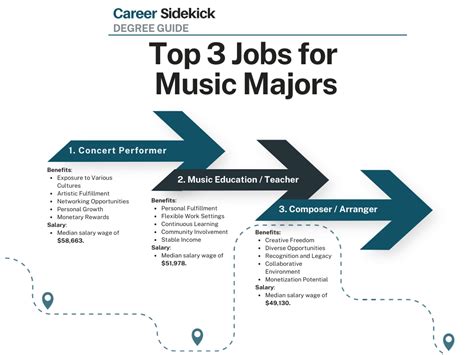For those passionate about music and eager to make a career in this dynamic industry, a music industry degree can open doors to a wide range of rewarding opportunities. This comprehensive article explores the various job roles available, the skills and qualifications required, and the career paths that graduates can pursue.

The Booming Music Industry
The global music industry is a multi-billion-dollar sector, with revenues projected to reach $143 billion by 2025, according to the International Federation of the Phonographic Industry (IFPI). This growth is driven by the rise of streaming services, digital distribution, and live concerts.
Types of Music Industry Degree Jobs
Music industry degree programs offer a range of specializations to cater to different career paths. Some of the most common job roles for graduates include:
1. Music Managers
Music managers represent and guide artists, handling their bookings, contracts, publicity, and career development. They require strong negotiation skills, a keen eye for talent, and a deep understanding of the music business.
2. Label Executives
Label executives oversee record labels, which are responsible for artist development, marketing, and distribution. They identify and sign new artists, create marketing campaigns, and manage production and distribution channels.
3. A&R Representatives
A&R (Artists and Repertoire) representatives scout and sign new artists for record labels. They evaluate talent, negotiate contracts, and provide guidance on artistic development.
4. Music Publishers
Music publishers represent the copyrights of songs and collect royalties on behalf of artists and songwriters. They negotiate licensing agreements for use of music in films, TV shows, commercials, and other media.
5. Music Producers
Music producers oversee the recording and mixing of music albums and tracks. They collaborate with artists, engineers, and musicians to create the final product.
Skills and Qualifications
Music industry degree programs typically cover a wide range of subjects, including music theory, history, business, law, and technology. Graduates should possess the following skills:
- Excellent communication and interpersonal skills
- Strong analytical and problem-solving abilities
- Knowledge of the music business and legal framework
- Ability to work independently and as part of a team
- Passion and dedication for music
Career Paths
Graduates with a music industry degree can pursue various career paths, including:
- Management: Artist management, label executive, tour manager
- Marketing: Digital marketing, social media marketing, promotions
- Production: Music producer, sound engineer, artist development
- Publishing: Copyright management, licensing, royalties
- Education: Music teacher, music professor, arts administrator
Effective Strategies for Success
To succeed in the music industry, graduates should consider the following strategies:
- Network: Attend industry events, connect with professionals on LinkedIn, and build relationships.
- Build a strong portfolio: Showcase your skills through internships, volunteer work, and personal projects.
- Stay up-to-date on industry trends: Read industry publications, follow music blogs, and attend workshops.
- Diversify your skills: Develop a range of skills, including business, marketing, and technology.
- Be persistent: The music industry is highly competitive, so don’t give up on your dreams.
Common Mistakes to Avoid
- Underestimating the importance of networking: Networking is crucial for building connections and finding opportunities.
- Not having a clear career path: Define your career goals early on and tailor your education and experience accordingly.
- Being unorganized: Manage your time and resources effectively to avoid stress and meet deadlines.
- Not being proactive: Seek out opportunities and don’t wait for them to come to you.
- Giving up too easily: The music industry is challenging, but with hard work and determination, you can achieve success.
Table 1: Music Industry Degree Programs
| Program | Institution | Location |
|---|---|---|
| Bachelor of Music in Music Industry | Berklee College of Music | Boston, MA |
| Bachelor of Arts in Music Industry | New York University | New York, NY |
| Bachelor of Science in Music Industry and Recording | Middle Tennessee State University | Murfreesboro, TN |
| Master of Music in Music Industry | University of Southern California | Los Angeles, CA |
| Master of Arts in Music Business | New York University | New York, NY |
Table 2: Skills and Qualifications for Music Industry Jobs
| Job Role | Skills | Qualifications |
|---|---|---|
| Music Manager | Negotiation, talent scouting, career development | Bachelor’s degree in music industry or related field |
| Label Executive | Marketing, artist development, contract management | Master’s degree in music business or equivalent experience |
| A&R Representative | Talent evaluation, contract negotiation, artist guidance | Bachelor’s degree in music industry or equivalent experience |
| Music Publisher | Copyright management, licensing, royalty collection | Bachelor’s degree in music industry or business |
| Music Producer | Recording, mixing, music theory | Associate’s or bachelor’s degree in music production or equivalent experience |
Table 3: Career Paths for Music Industry Graduates
| Career Path | Job Titles |
|---|---|
| Management | Artist manager, label executive, tour manager |
| Marketing | Digital marketer, social media marketer, promotions manager |
| Production | Music producer, sound engineer, artist developer |
| Publishing | Copyright manager, licensing specialist, royalty administrator |
| Education | Music teacher, music professor, arts administrator |
Table 4: Strategies for Success in the Music Industry
| Strategy | Description |
|---|---|
| Networking | Building relationships with industry professionals |
| Building a strong portfolio | Showcasing skills through internships and personal projects |
| Staying up-to-date on industry trends | Reading publications and attending industry events |
| Diversifying skills | Developing business, marketing, and technology abilities |
| Being persistent | Not giving up on career goals |
Conclusion
A music industry degree can provide a solid foundation for a successful career in the vibrant music industry. By acquiring the necessary skills and qualifications, networking, and pursuing a clear career path, graduates can make a significant contribution to this dynamic and ever-evolving field.
